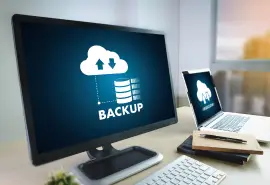If you're looking for electronic storage options for computer files, Storage Attached Network SAN and Network Attached Storage NAS are two viable options. Either can be a good choice, but the best option ultimately depends on your needs. A SAN storage system is comprised of a local network that includes several devices. A NAS storage system is one storage device that uses many files. Sometimes entities use a combination of both for optimal network security.
How are SAN and NAS different?
A Storage Attached Network SAN system is an intricate, interconnected series of storage devices, switches, and hosts. Essentially, it includes an entire network of devices from servers to end clients. This storage system uses a fibre channel that gives storage devices the opportunity to interconnect and share information with each other.
A Network Attached Storage NAS system, on the other hand, is a singular hardware device that is connected through an ethernet connection to a local area network (LAN). The NAS system has a server that verifies clients and manages files in a manner similar to regular file servers.
Pros and cons of both
Some companies choose a combination of SAN and NAS storage. Others use just one. If you're considering getting one or the other for data security, here are some advantages and disadvantages to using either one:
Benefits of NAS
- Centralized security
- Simple management
- Low cost
- Specialization
NAS data security has many benefits. One is that it consolidates file protection in a central location due to the fact that it is a singular system for distributing and storing files. Another advantage is its simple architecture. Since there are fewer moving parts, the system is less likely to break. Furthermore, installation and setup are very easy because it doesn't require changes to your current network architecture. Although prices vary based on factors like quality and system size, NAS is also typically a low-cost solution for a network security system.
Cons of NAS
- Limited resources
- Slower speed
- Network dependent
Naturally, NAS has some disadvantages, too. One is that it has limited resources, and therefore limited scalability. You can only scale up by adding on additional NAS devices. Secondly, NAS is one of the slower options for file storage. Lastly, it is network-dependent, which means that files exchanged over the local area network can cause congestion, delays, or interfere with other traffic on the LAN.
Ultimately, NAS is a great storage solution for an auxiliary storage mechanism or if you're just starting and need a simple, immediate storage solution.
Benefits of SAN
- High performance
- Fast backup
- Disaster recovery
SAN solutions, in contrast to NAS systems, are much faster. With SAN your devices won't need to access local storage, which makes them more efficient. The system doesn't consume as much power and operates at a cooler temperature. Since the network is relatively fast, backups are faster as well. Since a SAN network operates independently of others, it won't cause bottlenecks. Lastly, it is easy to replicate information from your main location to an offsite SAN storage facility. This makes it easy to get your system up and running quickly to minimize downtime.
Cons of SAN
- Complexity
- Initial cost
SAN systems are generally larger and more complex. They also have a higher initial cost than NAS systems, which is a deterrent for organizations with a smaller budget. Ultimately, SAN is a good choice for larger businesses looking for a faster storage solution that can manage multiple devices at once.
What industries are served?
SAN and NAS systems are ideal for industries needing information protection. That includes healthcare, public service, government, and non-profit organizations. Homeowners use both systems, too. Generally, small business owners prefer NAS systems for their ease of use and favorable price point.
Storage solutions are mechanical, meaning that there is a chance they will fail on you. Secure Data Recovery is here to help. We provide quality data recovery services for any device and storage system. Our highly trained engineers are also experienced with all varieties of RAID configurations. With a comprehensive network that includes offices nationwide, we are a recognized leader in data recovery and technological development. Contact us today to learn more about our services or start your recovery case at 800-388-1266.








